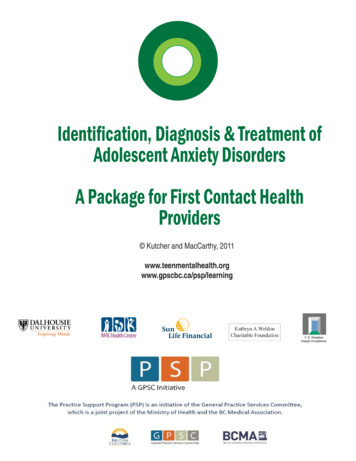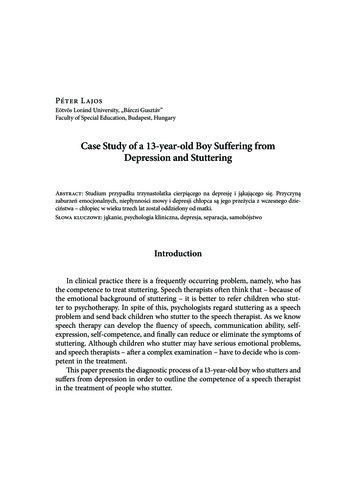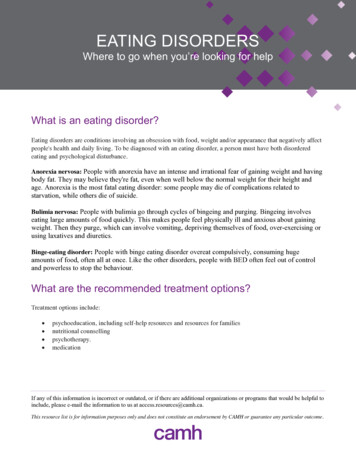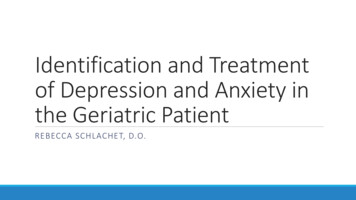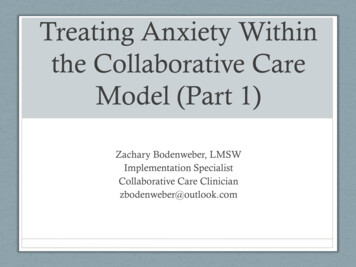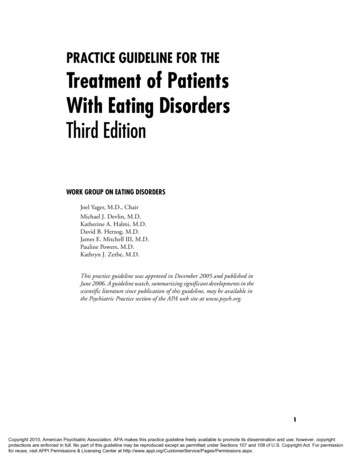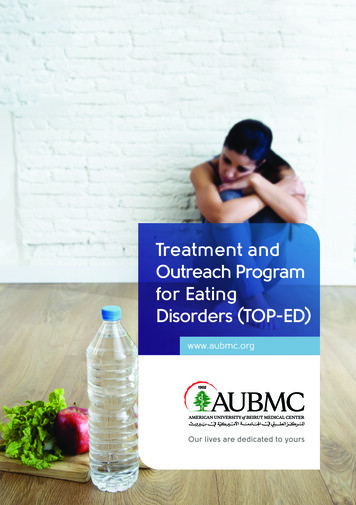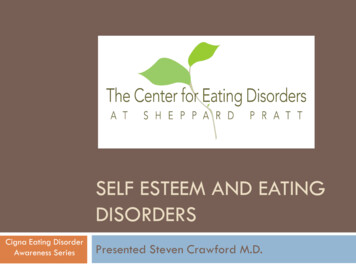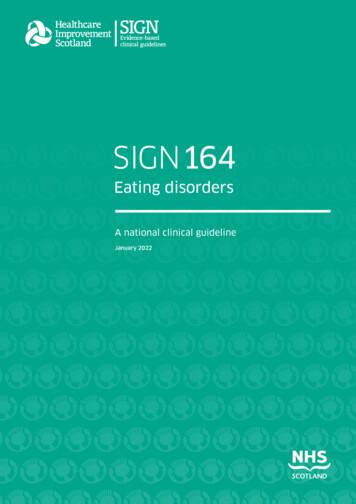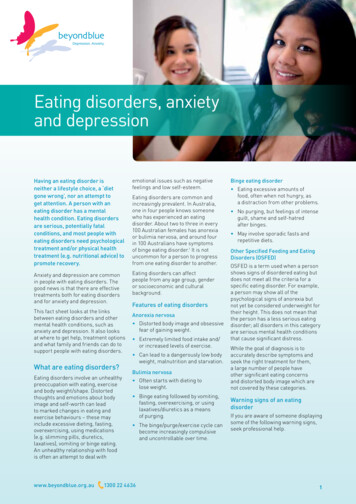
Transcription
Eating disorders, anxietyand depressionHaving an eating disorder isneither a lifestyle choice, a ‘dietgone wrong’, nor an attempt toget attention. A person with aneating disorder has a mentalhealth condition. Eating disordersare serious, potentially fatalconditions, and most people witheating disorders need psychologicaltreatment and/or physical healthtreatment (e.g. nutritional advice) topromote recovery.emotional issues such as negativefeelings and low self-esteem.Anxiety and depression are commonin people with eating disorders. Thegood news is that there are effectivetreatments both for eating disordersand for anxiety and depression.Eating disorders can affectpeople from any age group, genderor socioeconomic and culturalbackground.This fact sheet looks at the linksbetween eating disorders and othermental health conditions, such asanxiety and depression. It also looksat where to get help, treatment optionsand what family and friends can do tosupport people with eating disorders.What are eating disorders?Eating disorders involve an unhealthypreoccupation with eating, exerciseand body weight/shape. Distortedthoughts and emotions about bodyimage and self-worth can leadto marked changes in eating andexercise behaviours – these mayinclude excessive dieting, fasting,overexercising, using medications(e.g. slimming pills, diuretics,laxatives), vomiting or binge eating.An unhealthy relationship with foodis often an attempt to deal withwww.beyondblue.org.auEating disorders are common andincreasingly prevalent. In Australia,one in four people knows someonewho has experienced an eatingdisorder. About two to three in every100 Australian females has anorexiaor bulimia nervosa, and around fourin 100 Australians have symptomsof binge eating disorder.1 It is notuncommon for a person to progressfrom one eating disorder to another.Features of eating disordersAnorexia nervosa Distorted body image and obsessivefear of gaining weight. Extremely limited food intake and/or increased levels of exercise. Can lead to a dangerously low bodyweight, malnutrition and starvation.Bulimia nervosa Often starts with dieting tolose weight. Binge eating followed by vomiting,fasting, overexercising, or usinglaxatives/diuretics as a meansof purging. The binge/purge/exercise cycle canbecome increasingly compulsiveand uncontrollable over time.1300 22 4636Binge eating disorder Eating excessive amounts offood, often when not hungry, asa distraction from other problems. No purging, but feelings of intenseguilt, shame and self-hatredafter binges. May involve sporadic fasts andrepetitive diets.Other Specified Feeding and EatingDisorders (OSFED)OSFED is a term used when a personshows signs of disordered eating butdoes not meet all the criteria for aspecific eating disorder. For example,a person may show all of thepsychological signs of anorexia butnot yet be considered underweight fortheir height. This does not mean thatthe person has a less serious eatingdisorder; all disorders in this categoryare serious mental health conditionsthat cause significant distress.While the goal of diagnosis is toaccurately describe symptoms andseek the right treatment for them,a large number of people haveother significant eating concernsand distorted body image which arenot covered by these categories.Warning signs of an eatingdisorderIf you are aware of someone displayingsome of the following warning signs,seek professional help.1
Behavioural signs dieting or overeating excessively eating very quickly or very slowly eating only certain types andamounts of food avoiding social situations thatinvolve food ‘playing’ with food rather thaneating it going to the bathroom straightafter meals wearing loose-fitting clothes to hideweight loss preparing and cooking mealsfor others, but not actually eating engaging in repetitive or obsessivebehaviours relating to body shapeand weight (e.g. weighing) exercising excessively, feelingcompelled to perform a certainnumber of repetitions of exercisesor experiencing distress if unableto exercise.Physical signs weight loss or weight fluctuations sensitivity to the cold or feelingcold most of the time, even inwarm temperatures changes in or loss of menstrualpatterns fainting swelling around the cheeks or jaw,calluses on knuckles, or damageto teeth due to vomiting.Emotional or psychological symptoms thinking and talking a lot aboutbody image, body weight and food expressing extreme dissatisfactionwith body or having a distortedbody image becoming irritable or withdrawingfrom family and friends being sensitive to comments aboutfood, exercise, weight or body shape feeling anxious or depressed having difficulty concentrating having problems with relationships having suicidal thoughtsor behaviour.Eating disorders can result in a widerange of physical health problems,including severe malnutrition, orbrain, heart or kidney problems, whichmay lead to loss of consciousnessor death. People with untreatedeating disorders can die as a resultof these illnesses.What is anxiety?Anxiety is more than just feelingstressed or worried. Anxious feelingsare a normal reaction to a situationwhere a person feels under pressureand usually go away once the stressfulsituation has passed, or the ‘stressor’is removed.However, for some people theseanxious feelings happen for noapparent reason or continue afterthe stressful event has passed.For a person experiencing anxiety,anxious feelings cannot be broughtunder control easily. Anxiety can bea serious condition that makes it hardfor a person to cope with daily life.There are many types of anxiety andmany people with anxiety experiencesymptoms of more than one type.Living with an eating disorder is one ofmany things – such as a family historyof mental health conditions, stressfullife events and personality factors –that may trigger anxiety.Anxiety is common and the soonera person gets help, the sooner theycan recover.2Signs of anxietyThe symptoms of anxiety can oftendevelop gradually over time. Giventhat we all experience some anxiousfeelings, it can be hard to know howmuch is too much. In order to bediagnosed with an anxiety condition,it must have a disabling impact onthe person’s life. There are many typesof anxiety, and there are a range ofsymptoms for each.Anxiety can be expressed in differentways such as uncontrollable worry,intense fear (phobias or panic attacks),upsetting dreams or flashbacks of atraumatic event.Some common symptoms of anxietyinclude: hot and cold flushes racing heart tightening of the chest snowballing worries obsessive thinking andcompulsive behaviour.There are effective treatmentsavailable for anxiety. For moreinformation on anxiety and treatmentssee the beyondblue Understandinganxiety fact sheet or visitwww.beyondblue.org.au/anxiety
What is depression?While we all feel sad, moody or lowfrom time to time, some peopleexperience these feelings intensely,for long periods of time (weeks,months or even years) and sometimeswithout any apparent reason.Depression is more than just a lowmood – it’s a serious condition thathas an impact on both physical andmental health.Depression affects how a personfeels about themselves. A personmay lose interest in work, hobbiesand doing things he or she normallyenjoys. Some people may lack energy,have difficulty sleeping or sleep morethan usual, while some people feelanxious or irritable and find it hardto concentrate.The good news is that just like aphysical condition, depression istreatable and effective treatmentsare available.Signs of depressionA person may be depressed if he orshe has felt sad, down or miserablemost of the time for more than twoweeks and/or has lost interest orpleasure in usual activities, and hasalso experienced some of the signsand symptoms on the list below.It’s important to note that everyoneexperiences some of these symptomsfrom time to time and it may notnecessarily mean a person isdepressed. Equally, not every personwho is experiencing depression willhave all of these symptoms. Thesymptoms will not provide a diagnosis– for that you need to see a healthprofessional – but they can be usedas a guide. trouble getting to sleep, stayingasleep and being tired duringthe day feeling worthless, helplessand guilty increased irritability, frustrationand moodiness feeling unhappy, sad or miserablemost of the time thoughts such as, “I’m a failure”,“Life’s not worth living”, “Peoplewould be better off without me”.As with anxiety, there are effectivetreatments available for depression.For more information on depressionand treatments see beyondblue’sAnxiety and depression: An informationbooklet or visit www.beyondblue.org.au/depressionWhat are the links betweeneating disorders, anxietyand depression?Research indicates there is a linkbetween anxiety, depression andeating disorders. Eating disorders arethought to affect about 9 per cent ofthe population2, and almost 3 millionAustralians are living with depressionor anxiety.3 One in five women andone in eight men will experiencedepression at some time in theirlife. On average, one in four peoplewill experience anxiety.3 People witheating disorders are twice as likelyto experience anxiety and depressionwhen compared to people in the widercommunity. One study found thatclose to 50 per cent of adolescentswith eating disorders had high levelsof anxiety and depression, especiallythose with bulimia.4However, it is unclear whetherdepression is a risk factor for aneating disorder, or occurs as a resultof an eating disorder. Depressioncan make people more likely to feelnegatively about their bodies andthemselves – this may put them atrisk of developing an eating disorder.Eating disorders may also makepeople more at risk of developingdepression, particularly if theyexperience rapid weight loss orstarvation.Research has demonstrated thatpeople with anorexia nervosa tendto have childhood and personalitycharacteristics such as obsessionsand perfectionism, suggesting thatthey have an underlying anxious traitthat precedes the eating disorder.The conditions also share many riskfactors: biological factors genetic factors e.g. a family historyof mental health problems social factors e.g. media emphasison a ‘thin ideal’ of beauty psychological factors e.g. lowself-esteem, ineffective copingstrategies and poor relationships.Managing anxiety and depression cangreatly improve people’s wellbeing andquality of life as well as their eatingdisorder and their attitude towards it.People with anxiety and/or depressioncan find it difficult to take the firststep in seeking help. They may needthe support of family, friends and/or ahealth professional.Some common symptoms ofdepression include: not going out anymore, loss ofinterest in enjoyable activities withdrawing from close familyand friends being unable to concentrate andnot getting things done at workor school feeling overwhelmed, indecisiveand lacking in confidence increased alcohol and drug use loss or change of appetite andsignificant weight loss or gain3
Interpersonal therapy (IPT)is also effective for treatingdepression and some types ofanxiety. It helps people find newways to get along with others andto resolve losses, changes andconflict in relationships.Psychological therapies may notonly help with recovery, but can alsohelp prevent a recurrence of anxietyor depression. These therapies helpbuild skills in coping with stressful lifecircumstances and can be provided bya psychologist, psychiatrist or othertrained health professional.MedicationAntidepressant medication, alongsidepsychological therapies, can also playa role in the treatment of moderateto severe depression and someanxiety conditions.What are the treatments foreating disorders, anxietyand depression?There is no one proven way thatpeople recover from an eatingdisorder, anxiety or depression and it’sdifferent for everybody. However, thereis a range of effective treatments andhealth professionals who can helppeople on the road to recovery. Thereare also many things that people withanxiety, depression and an eatingdisorder can do to help themselves torecover and stay well. The importantthing is finding the right treatmentand the right health professional thatworks for you.Physical health managementPhysical health management aimsto monitor, restore and maintain aperson’s nutritional balance (avoidingstarving or overeating) and also treatthe longer-term physical problemsthat result from unhealthy eatingpatterns. The treatment usuallyinvolves seeing a doctor and/or adietitian, developing a plan for healthyeating and having regular check-ups.Some people need more intense andstructured care in hospital. Beingadmitted to hospital for treatmentof weight loss occurs only if theindividual is very malnourished.Psychological treatmentsDifferent types of anxiety ordepression require different typesof treatment. This may includephysical exercise for preventing andtreating mild anxiety and depression,through to psychological andmedical treatment for more severeepisodes. The treatment for anxietyand depression in someone with aneating disorder involves a coordinatedapproach that monitors and treats thesymptoms of anxiety, depression andthe eating disorder.Psychological treatment for eatingdisorders begins to address eatingpatterns and related thoughts,feelings and behaviours by helpingpeople find new ways of thinkingabout and handling issues such asself-esteem, control, perfectionismand family problems. This can includeindividual and family therapy andpsycho-education (information onpsychological issues). Psychologicaltherapies are also used to treatanxiety and depression.Professional treatment for eatingdisorders involves managing physicalhealth (including nutritional advice)and promoting mental health. Inaddition, medication, support groupsand some alternative therapies maybe helpful. Cognitive behaviour therapy (CBT)is an effective treatment for peoplewith anxiety and depression. Itteaches people to evaluate theirthinking about common difficulties,helping them to change theirthought patterns and the way theyreact to certain situations.Making a decision about whichantidepressant is best for a personcan be complex. The decision willbe made in consultation with adoctor, after careful assessmentand consideration. The doctorshould discuss differences ineffects and possible side-effects ofmedications. Stopping medicationshould only be done gradually, witha doctor’s recommendation andunder supervision.A doctor or treating healthprofessional will take into accountseveral factors when suggestingthe most suitable treatment. Regularcontact with and ongoing assessmentby a doctor to check that treatmentsare working effectively is an importantpart of becoming and staying well.Most people taking medication willalso benefit from psychologicaltherapies, which will reduce thelikelihood of relapse after the personhas stopped taking the medication.Who can assist?A General Practitioner (GP) is a goodfirst step to discuss your concerns.A good GP can: make a diagnosis check for any physical healthproblem or medication that maybe contributing to the condition discuss available treatments4
if appropriate, work with theperson to draw up a MentalHealth Treatment Plan so heor she can get a Medicare rebatefor psychological treatment provide brief counselling or,in some cases, psychologicaltherapies prescribe medication refer a person to a mental healthspecialist such as a psychologist,social worker or psychiatrist.Make sure that the doctor managingyour eating disorder knows if youhave anxiety or depression. It isrecommended that people consulttheir regular GP or another GP in thesame clinic, as medical informationis shared within a practice.Psychologists are health professionalswho provide psychological therapiessuch as cognitive behaviour therapy(CBT) and interpersonal therapy(IPT). Psychologists are not doctorsand cannot prescribe medicationin Australia.Psychiatrists are doctors whospecialise in mental health. Theycan make medical and psychiatricassessments, conduct medicaltests, provide therapy and prescribemedication. Psychiatrists often usepsychological treatments such asCBT, IPT and/or medication. If thecondition requires hospital admission,a psychiatrist will be in charge of theperson’s treatment.Mental health nurses are speciallytrained to care for people with mentalhealth conditions. They work withpsychiatrists and GPs to review aperson’s mental health, monitormedication and provide informationabout mental health conditions andtreatment. Some have training inpsychological therapies.Social workers in mental health arespecially trained to work with peoplewho are experiencing difficulties inlife. Social workers can help peoplefind ways to manage more effectivelysome of the situations that triggerthese conditions such as familyissues, financial problems, workstress and living arrangements.Mental health social workers can alsoprovide focused psychological selfhelp strategies.5Occupational therapists in mentalhealth help people who, because of amental health condition, have difficultyparticipating in normal, everydayactivities. Mental health occupationaltherapists also provide focusedpsychological self-help strategies.Aboriginal and Torres Strait Islandermental health workers understandthe mental health issues of Indigenouspeople and what is needed to provideculturally safe and accessible services.Some may have undertaken trainingin mental health and psychologicaltherapies. Support provided byAboriginal and Torres Strait Islandermental health workers mightinclude, but is not limited to, casemanagement, screening, assessment,referrals, transport to and attendanceat specialist appointments, education,improving access to mainstreamservices, advocacy, counselling,support for family and acutedistress response.The cost of treatment from a mentalhealth professional varies. However,in the same way that people can geta Medicare rebate when they see adoctor, they can also get part or all ofthe consultation fee subsidised whenthey see a mental health professionalfor treatment of anxiety or depression.See beyondblue’s Getting help –How much does it cost? fact sheet atwww.beyondblue.org.au/resourcesTo find a mental health practitionerin your area, visit www.beyondblue.org.au/find-a-professional or callthe beyondblue Support Service on1300 22 4636.Helpful strategies and tips Learn about anxiety, depressionand eating disorders and how theseconditions interact. Develop a mental health plan withyour doctor. Visit your doctor regularly to reviewyour eating disorder and mentalhealth management. Talk to your doctor about possiblebarriers to treatment, such as cost,organisation or planning, as well aswhat to do if your condition worsens. Get help, support andencouragement from family andfriends and have them help youto follow your mental health plan. Learn relaxation techniques. Get involved in social activities. Stay active and exercise underthe supervision of a doctor. Eat healthily and include a widevariety of nutritious foods. Limit your use of alcohol, tobaccoand caffeine.
How family and friendscan help When a person has an eatingdisorder and anxiety or depression,it can affect family and friends. It’simportant for family and friends tolook after their own health as wellas looking after the person who hasan eating disorder. Learn about eating disorders,anxiety and depression and theirsymptoms to help you recognisewarning signs. Encourage the person to go tothe doctor if their eating disorder,anxiety or depression gets worse.Make sure you seek help if youthink you need it, too. Support the person by helpingthem to follow their mental healthplans. Gently remind the person totake their anxiety and depressionmedication regularly and to attendall their medical appointments. Encourage the person to do thingsthat they would normally enjoy. Look after your own health byeating well, exercising regularly,getting enough sleep and doingthings that you enjoy, too.Where to find more informationbeyondbluewww.beyondblue.org.auLearn more about anxiety and depression, or talk it through withour support service.1300 22 4636Email or chat to us online at ww.mindhealthconnect.org.auAccess to trusted, relevant mental health care services, onlineprograms and resources.The Butterfly Foundationwww.thebutterflyfoundation.org.au1800 33 4673Education, support and services for people with eating disorders andtheir families.National Eating Disorder Collaborationwww.nedc.com.auEvidence-based information on eating disorders; their prevention,identification and treatment.Eating Disorders Foundation of Victoriawww.eatingdisorders.org.au1300 550 236Support and information for people with eating disorders and their familiesin Victoria.Eating Disorders Foundation of ACT (EDFACT)References Victorian Centre of Excellence in EatingDisorders & Eating Disorders Foundation ofVictoria (2004). An Eating Disorders Resource forSchools. A Manual to Promote Early Interventionand Prevention of Eating Disorders in Schools.Melbourne: beyondblue.1 Weltzin T E, Weisensel N, Franczyk D, BurnettK, Klitz C, and Bean P. (2005). Eating disordersin men: Update. Journal of Men’s Health &Gender, 2(2), 186-193.2 Australian Bureau of Statistics (2008). NationalSurvey of Mental Health and Wellbeing: Summaryof Results 2007 (4326.0). Canberra: ABS.3 Patton GC, Coffey C & Sawyer SM (2003).The outcome of adolescent eating disorders:findings from the Victorian Adolescent HealthCohort Study. European Child & AdolescentPsychiatry 12: I/25-9.4(02) 6166 1679info@edfact.org.auInformation and referral for people with eating disorders and their familiesin the ACT.Eating Disorders Association Inc (QLD)www.eda.org.au(07) 3394 3661Support and referral for people with eating disorders and their families in QLD.Anxiety, Compulsive and Eating Disorders Association (ACEDA) SAwww.aceda.org.au(08) 8237 4011Information and support for people with eating disorders, their friendsand families in SA.Bridges Association Inc (WA)www.bridges.net.auInformation and support for all people affected by eating disorders in WA.The Centre for Eating and Dieting Disorders (NSW)www.cedd.org.auInformation for people with eating disorders, their family and friends in NSW.beyondblue would like to acknowledgethe assistance of the NationalEating Disorder Collaboration in theproduction of this fact sheet.www.beyondblue.org.au1300 22 onate online www.beyondblue.org.au/donations Beyond Blue Ltd. BL/0700 03/14
eating disorder, or occurs as a result of an eating disorder. Depression can make people more likely to feel negatively about their bodies and themselves - this may put them at risk of developing an eating disorder. Eating disorders may also make people more at risk of developing depression, particularly if they experience rapid weight loss or
